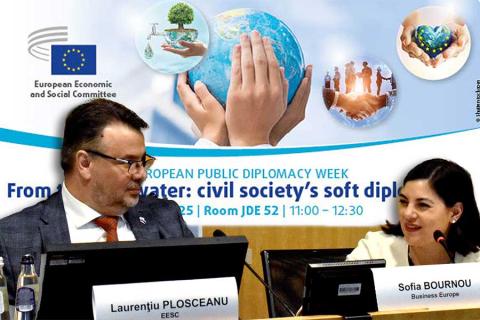European Economic
and Social Committee
Civil Society Speaks: Public Diplomacy – in Brussels and beyond
On 25 June, the European Economic and Social Committee (EESC) organised an event as part of European Public Diplomacy Week, held for the first time by the European External Action Service (EEAS). The participants highlighted a fundamental dimension of European action: the contribution of civil society to public diplomacy, from international trade to water, through enlargement.
During Public Diplomacy Week, which took place in Brussels from 23-27 June 2025, different institutions engaged in discussions and presented public diplomacy and international people-to-people initiatives. As such, the event From trade to water: civil society's soft diplomacies, organised by the EESC's External Relations section, brought together EESC members and experts from trade, water and enlargement to talk about the engagement of civil society in these three areas.
Opening the event, EESC Vice-President for Communication Laurenţiu Plosceanu said: 'When official diplomacy has limited outreach due to political or other issues, civil society can provide added value.'
In her keynote speech Vesna Kos, EU Ambassador to the Council of Europe, described civil society as an engine of soft power shaping diplomacy in real time, where power should not only be measured in tanks, tariffs and treaties, but in the trust built by civil society.
Civil society's soft power in the area of trade agreements is undeniable, but, as Tanja Buzek, EESC member and Vice-President of the EESC’s International Trade Follow-up Committee, pointed out 'there is a gap for civil society to engage during the negotiations and this is a gap that needs to finally be closed.'
Discussing how civil society can play an active role in EU accession, the participants stressed that enlargement is not merely a technical process of legislative harmonisation. It is a human dynamic, a rapprochement between citizens, workers and organisations that share the same democratic and social values. In this process, the involvement of civil society is crucial, as enlargement also means transformation of societies.
The event concluded with the panel on the theme of tackling water scarcity together with the Global South.
EESC member Milena Angelova, rapporteur on Blue Diplomacy, and Thomas Rebermark, Director of the Swedish Water House at the Stockholm International Water Institute (SIWI), mentioned that water can become an instrument for peace and development, because civil society organisations are the connective tissue in the global water and climate landscape, ensuring that water resource management is rooted in the realities of those most affected by water scarcity and climate change. (at)
